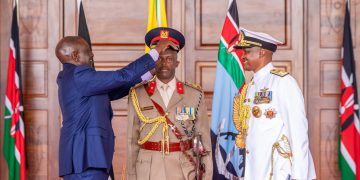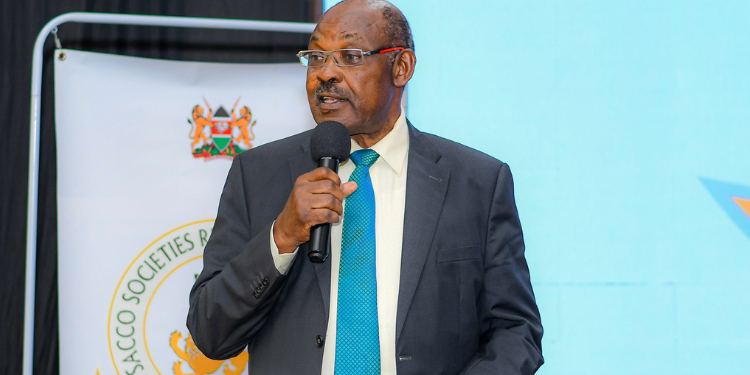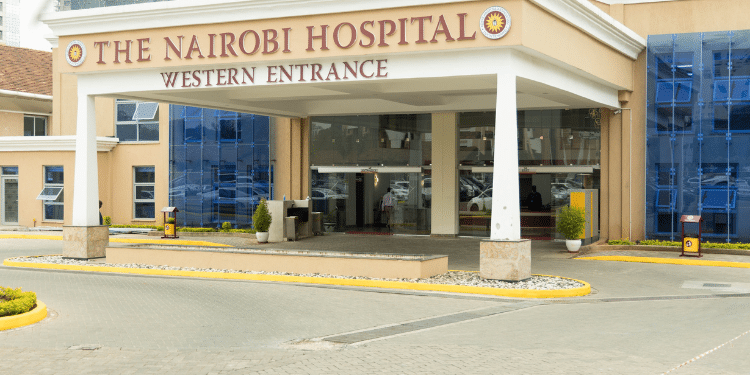The Nairobi Hospital has grown to become one of the leading providers of healthcare services in the East African region.
Sir Evelyn Baring, the then Governor of Kenya Colony, laid the Hospital’s foundation stone on the morning of October 20, 1952.
It started operations in 1954 as the European Hospital, and it has grown to a modern high-technology facility with more than 363 bed capacity, six outpatient centres and a global medivac centre.
In 1956, The Nairobi Hospital’s Cicely McDonnell School of Nursing was established.
It was aptly named after Cicely McDonnell, who had made an immense personal contribution to the welfare and health of Kenyans.
He also set high professional standards for maternity nursing in Nairobi.
Nairobi Hospital’s team absorbs most graduates from the School of Nursing.
The combination of highly skilled medical specialists and modern medical and non-medical technology has placed the hospital in a position to undertake a wide range of routine and complex investigations and procedures, including Open Heart Surgery, Kidney Transplants, Trauma Care, Orthopaedic Surgery, Neurosurgery, Laparoscopic Surgery, and Cancer Therapy, among others.
The Hospital is currently renowned for emergency and trauma care, disaster response and critical care and has excellent facilities for providing high-quality clinical and nursing care.
It opened the Anderson Speciality Centre in 2017 and has a variety of speciality clinics, including Orthopaedic, Well Baby and Executive Clinic.
Owners and Governance
The Nairobi Hospital is owned and managed by the KHA, a non-profit entity.
KHA is a membership-based non-profit, comprising over 3,000 hospitals and health service providers across Kenya.
It ensures the hospital’s compliance with the law while maintaining the highest standards of corporate governance and business ethics.
Outpatient Medical Centres
KHA also manages six outpatient medical centres across Nairobi.
These centres served more than 96,000 patients annually.
Under a USTDA-supported expansion initiative,
KHA also secured funding from U.S. Trade and Development Agency (USTDA) to conduct a feasibility study for establishing five new medical centres outside Nairobi.
The goal of the study is to enhance access to oncology, maternal health services, and IT-integrated care.
Also Read: Penda Health Centre History, Owners, and Founders
Nairobi Hospital Management
KHA members elect the board of directors. The board then appoints the Chief Executive Officer (CEO).
The Nairobi Hospital Board of Management is in charge of the hospital’s corporate governance and is accountable to KHA.
Nairobi Hospital Board complies with the 2/3 gender rule, with 34% female and 64% male members.
Dr. Barcley Onyambu is the Chairman, while Samson Mbuthia Kinyanjui serves as the Vice Chairman.
Felix Osano is the Chief Executive Officer. Samuel Odede is the Director of Medical Services & Research, and Margret Muiyoro is the Acting Director of Nursing Services.
Also Read: Bishop Paul, Egyptian Doctor Who Founded Coptic Hospital in Nairobi
Nicodemus Odongo is the Director of Strategy & Innovation and also the Acting Director of Supply Chain & Distribution.
William Masita is the Director of Finance, and Dr. Magdalyne Wambui Kamande is the Director of Transformation Services and ICT.
Gilbert Nyamweya serves as the Company Secretary, while Dr. Margaret Sirima, PhD, is the Principal of the College of Health Sciences.
Weldon Rotich is the Head of Internal Audit & Controls, Antipas Nyambok is the Head of Operations, Major (Rtd) Guido Aido Leariwala is the Chief Security Officer, and Trevour Adudah is the Acting Head of Engineering.
Follow our WhatsApp Channel and X Account for real-time news updates.




















































![Senator Allan Chesang And Chanelle Kittony Wed In A Colourful Ceremony [Photos] Trans Nzoia Senator Allan Chesang With Channelle Kittony/Oscar Sudi]( https://thekenyatimescdn-ese7d3e7ghdnbfa9.z01.azurefd.net/prodimages/uploads/2025/11/Trans-Nzoia-Senator-Allan-Chesang-with-Channelle-KittonyOscar-Sudi-360x180.png)























